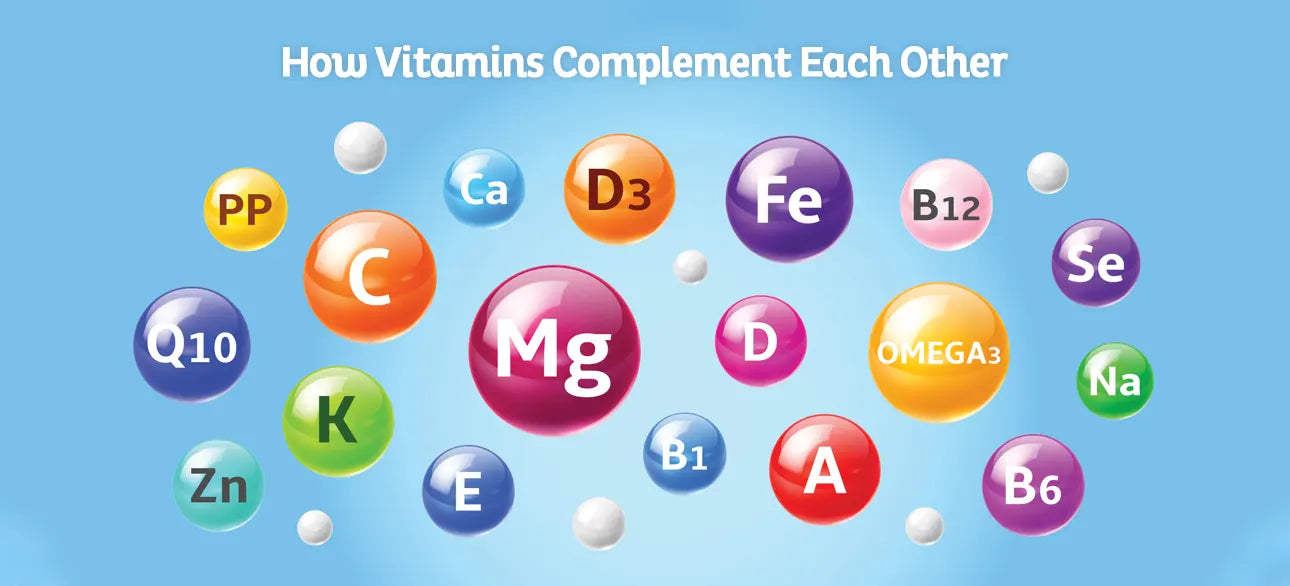How Long Does It Take for Vitamins To Work?
Learn when vitamins and supplements start working, typical timelines for different types, signs of effectiveness, and how to get the most from your daily vitamins.
Advertiser Disclosure: We independently select all the products. If you click through links we provide, we may earn a commission.

Key Takeaways
- Absorption times vary for different vitamins, with water-soluble ones like vitamin C and B12 absorbed quickly, while fat-soluble vitamins like D, A, E, and K take longer to show effects.
- Vitamins work best when taken with the right foods. Fatty foods help improve absorption of fat-soluble vitamins, and pairing vitamin D with magnesium and K2 enhances its effectiveness.
- Benefits from vitamins may include increased energy, better skin, reduced muscle cramps, and improved immune response. Results typically take 4-8 weeks.
- Consistency, diet, and health conditions affect how long it takes for vitamins to work.
- The article explains the factors that influence how long it takes for vitamins to show results.
Vitamins and supplements are taken widely to boost health, fix nutritional shortages, or handle certain health problems. Many people often wonder, how soon will I notice the effects of vitamins? It depends on what type of vitamin you’re taking, your body’s requirements and how faithfully you take the tablets.
Some vitamins are absorbed fast and start affecting you in just a few days, yet others need much longer to become noticeable. When you are aware of these timelines, you know to have patience and understand what to expect.
This article discusses the ways vitamins and minerals help your health, the usual time it takes to see them work, clues that indicate they’re helping and how to get the most from them.
Being aware of when you might notice results can help you get the most out of taking multivitamins, vitamin D or other special supplements.
Factors Affecting How Long Vitamins Take to Work
Many factors influence how long vitamins will take to work in your body. The absorption rate varies depending on whether the vitamins are water-soluble or fat-soluble.
- Water-soluble vitamins, including the B vitamins and Vitamin C, are absorbed directly into the bloodstream through the small intestine, and they are not stored in the body, meaning any excess is excreted daily in urine.
- On the other hand, fat-soluble vitamins, such as Vitamin A, D, E, and K, require fat to be absorbed. These should ideally be taken alongside healthy fats like nuts, seeds, or olive oil to improve absorption.
- If you have a nutrient deficiency, changes may be more noticeable, and supplements can help in restricted diets or diagnosed deficiencies, though a balanced diet remains most important.
- Some vitamins can be absorbed only if paired with fat, but others go directly into the blood without this.
- Regular intake is essential to keep up with the timing you need.
- Additionally, fat-soluble vitamins are stored in the liver and fat tissue, which allows them to be available for longer periods.
- Vitamins are affected by overall health, how you eat, your medicine and the health conditions you have.
According to Maya Feller, MS, RD, CDN, “The time it takes for vitamins to show noticeable benefits varies widely depending on the nutrient type and individual health status. Consistent daily intake and proper absorption are key to unlocking their full potential.”
Typical Time Frames for Different Vitamins to Show Effects
Water-Soluble Vitamins (e.g., Vitamin C, B-complex)
Water-soluble vitamins break down in water and are rapidly picked up by the blood. For instance:
- Vitamin C — Many people want to know just how long does it take for vitamin C to work. Within a few days or a couple of weeks, you may find your response to the disease is stronger or your skin looks better.
- Vitamin B12 — Many people ask, how long does vitamin B12 take to work? Anyone who has a vitamin B12 deficiency may notice improvements in both their energy levels and their neurological health within days or a few weeks.
Being able to differentiate between fat-soluble and water-soluble vitamins can be helpful when it comes to figuring out dosage and timings. Water-soluble supplements are the faster-acting of the two types, thanks to the ease with which they enter the bloodstream. Since the body can’t save up much of these vitamins, they must be provided daily in your meals.
Fat-Soluble Vitamins (e.g., Vitamins A, D, E, K)
As these vitamins are kept in fat tissue and the liver, you might notice their effects later on. This is because they are stored and released slowly from these tissues.
- People often ask how quickly vitamin D3 starts working. In most cases, symptoms like bone pain and fatigue do not improve until the blood level has gone up significantly, which can take weeks to months.
- For vitamins A, E, and K, you have to be patient before their positive effects become clear. It’s also important to avoid excessive intake, as these vitamins can accumulate in the body.
Being fat-soluble means these vitamins are stored in the body, creating a backup supply. This also means that while they are less likely to cause deficiencies, you should watch the quantities consumed to avoid excessive buildup. Extremely high levels of fat-soluble vitamins can cause health problems.
From my 25 years of experience working with clients struggling with fatigue and autoimmune conditions, I've seen that water-soluble vitamins like B12 and C typically show effects within 2-4 weeks because they're quickly absorbed and utilized, while fat-soluble vitamins like D need 6-12 weeks since they require proper fat intake for absorption. The biggest game-changer I've witnessed is consistency paired with whole foods - I always tell my clients that taking vitamin D with a handful of nuts or having their B-complex with breakfast dramatically improves results compared to taking supplements on an empty stomach or sporadically.
- Livia Esterhaz, Board Director / Menopause Health Coach / Leader / Speaker / Educator
Minerals (e.g., Iron, Magnesium, Calcium)
Not all minerals are absorbed or work the same way at the same time.
- Iron: When treating anemia caused by iron deficiency, a person can expect improvement in energy and blood counts in several weeks to months.
- Magnesium and Calcium: The effects of Magnesium and Calcium vary depending on if they are deficient. Magnesium could help ease muscle cramps or improve your sleep in only days to weeks, but you should take calcium for bone health over a longer time.
Specialty Supplements (e.g., Probiotics, Omega-3s)
The timeline for specialty supplements varies widely:
- Probiotics: Effects on gut health may appear within days, but lasting changes can take longer.
- Omega-3 fatty acids: Benefits for heart health or inflammation may take weeks to months.
Signs You Are Getting Benefits from Vitamins
 Benefits from Vitamins
Benefits from Vitamins
Knowing when vitamins start working can be subtle. Some common signs include:
- Increased energy and reduced fatigue (often seen with B vitamins or iron).
- Improved immune response (vitamin C).
- Better skin, hair, or nail health.
- Reduction in muscle cramps or joint pain.
- Improved digestion or gut comfort (probiotics).
When to Expect Results and How Long to Continue
Vitamins usually take between 4 and 8 weeks to show any obvious benefits when taken on a regular basis. The body uses this time to process, restore and change physically after eating. The body needs time to improve when using vitamins. Don’t rush and keep following your usual plan.
If you haven’t noticed any changes after two months, get in touch with a healthcare provider. Sometimes, a bigger dose, a different mineral or tests are necessary to find out what your body needs and what symptoms need attention. Following your routine and listening to a professional helps you the most with supplements.
Tips for Maximizing Vitamin Effectiveness
To get the most out of your vitamins:
- Take vitamins with food: Especially fat-soluble vitamins require dietary fat for proper absorption.
- Avoid interactions: Some medications or supplements can reduce vitamin effectiveness. For example, calcium may reduce iron absorption, vitamin K can influence blood thinners, high doses of vitamin E may affect certain anticoagulants, and magnesium can reduce the absorption of some antibiotics.
- Maintain a balanced diet and healthy lifestyle: Vitamins complement but do not replace whole-food nutrition.
- Store vitamins properly: Heat, light, and humidity can degrade potency.
Common Misconceptions About Vitamins
There are several myths around vitamins that can cloud expectations:
- Vitamins as quick fixes: Many expect immediate results, but vitamins typically support slow and steady health improvements.
- Immediate results vs. gradual improvements: While some effects (like increased energy) may appear early, others (like bone health) take longer.
- Role of vitamins vs. whole-food nutrition: Dietary supplements help fill gaps but cannot replace the benefits of a nutrient-rich diet.
Conclusion
How long it takes for vitamins to work depends on the type of vitamin or mineral, your body’s needs, and consistent use. For example, the best vitamin for women targeting specific health needs may take time to show noticeable effects. Water-soluble vitamins often show results in days to weeks, fat-soluble vitamins take longer, and minerals vary widely. Giving supplements at least 4 to 8 weeks before evaluating their impact is essential.
Vitamins are not magic bullets but part of a holistic approach to health. Consistent, informed supplementation paired with a balanced diet and lifestyle is the best way to experience their benefits.
Always consult healthcare providers for personalized guidance, especially if you experience no improvement or have complex health issues. For additional support, you can also reach out to Flawless Bloom for help.
FAQs
References
Flawless Bloom has strict sourcing policies and relies on primary sources such as medical organizations, academic institutions, governmental agencies, and peer-reviewed scientific journals. Read more about how we ensure our content is accurate, thorough, and unbiased by reading our editorial process.
- Biochemistry, Water Soluble Vitamins - StatPearls - NCBI Bookshelf https://www.ncbi.nlm.nih.gov/books/NBK538510/
- Effects of magnesium supplementation on muscle soreness in different type of physical activities: a systematic review https://pmc.ncbi.nlm.nih.gov/articles/PMC11227245/
- Digestive Health - Harvard Health https://www.health.harvard.edu/topics/digestive-health































1 commentaire
I’ve been taking my daily vitamins for a couple of weeks now, and I’m already noticing a difference! My energy levels have definitely improved, and I’m feeling more focused throughout the day. This article was super helpful in explaining how vitamins work and how long to expect before seeing results. It’s great to know that consistency is key, and I feel more confident in my vitamin routine now. Looking forward to even more benefits as I keep going!